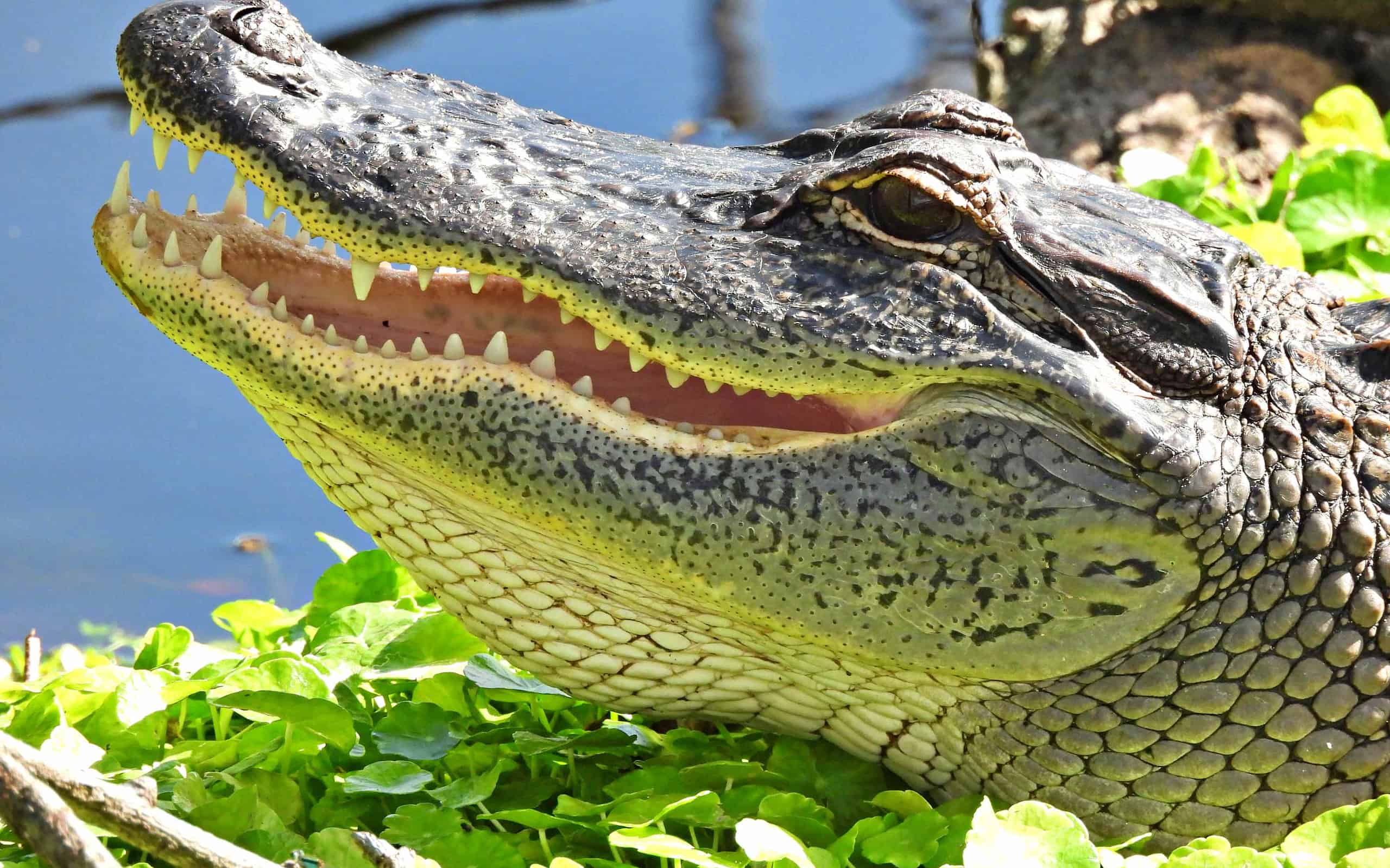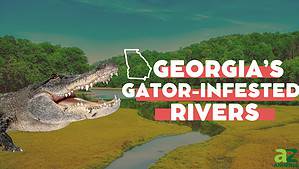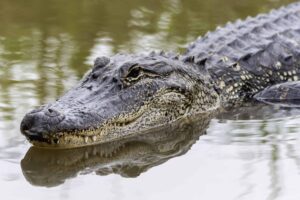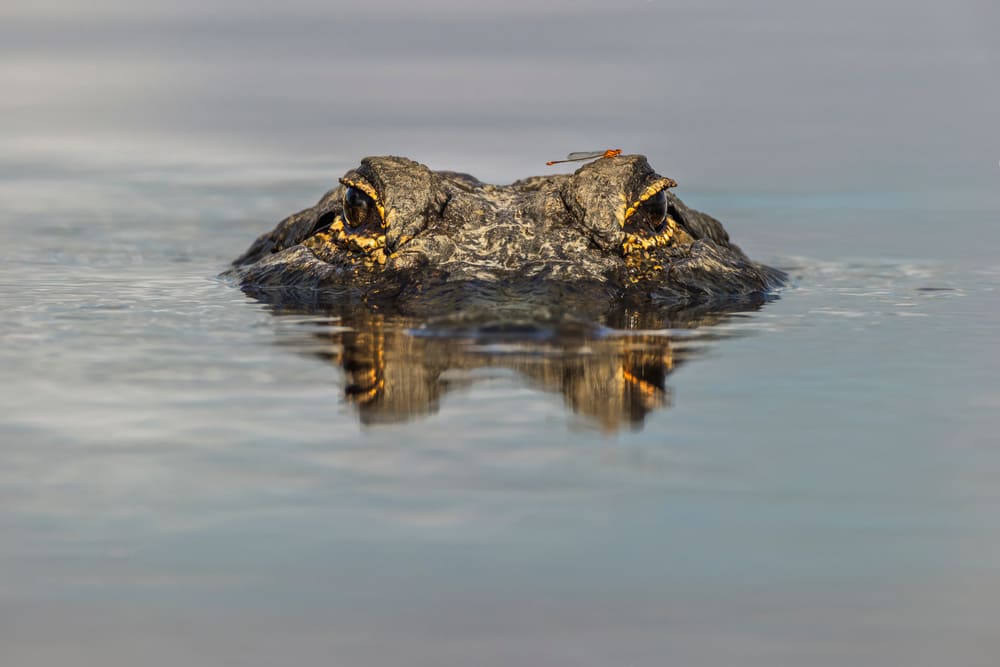
Alligator hunting in Texas is overall a simple process, as long as you own some land.
©Danita Delimont/Shutterstock.com
Have you thought about catching an alligator? If you are thinking about catching one in Texas, you’re in luck. Compared to some other states, Alligator hunting in Texas is pretty simple. There are some specific rules you need to know before getting started, but overall, it’s an uncomplicated process.
If you want to make sure you understand all the rules, however, read below to find out more!
Hunting Season

Out of all the counties in Texas, only 22 count as core counties.
©Rainer Lesniewski/iStock via Getty Images
There are actually two hunting seasons in Texas for alligators. The first runs from April to June. The second is shorter and goes from the middle of September until the end. These two hunting seasons have vastly different rules and locations where they occur.
Core
Core counties are the prime historical locations for alligator growth and habitat for alligators. These areas are carefully monitored to keep track of the alligator population. The number of tags released a year comes about from these intensive studies.
The core season is a rather short period. It lasts over twenty days and runs from about September 10th to 30th.
The 22 core counties are:
- Angelina
- Brazoria
- Calhoun
- Chambers
- Galveston
- Hardin
- Jackson
- Jasper
- Jefferson
- Liberty
- Matagorda
- Nacogdoches
- Newton
- Orange
- Polk
- Refugio
- Sabine
- San Augustine
- San Jacinto
- Trinity
- Tyler
- Victoria
For these core counties, and certain special properties throughout the state, it’s illegal to hunt an alligator unless you possess CITES tags and they are on your person at the time of hunting. To get a CITES tag, you must apply. Then, the TPWD (Texas Parks and Wildlife Department) will do a site inspection and evaluation before handing over the tags.
These tags are only good for the property that was inspected. They cannot be transferred. You are allowed one alligator per CITES tag provided by TPWD.
Non-Core
Non-core counties are all the other counties not mentioned above. Every county in Texas has alligator hunting, so by default, if they aren’t listed above, they automatically fall into the non-core category.
In non-core counties, the alligator hunting season goes from around April 1 to June 30. Per license per year, you are allowed one alligator. If you took an alligator from certain property during the previous September season, you are not allowed to take an alligator from that place again in this season.
Alligators must be hunted on private property. If it is not your property, you must get permission from the property owner first.
When an alligator is killed in a non-core county, a WRD tag must immediately be attached to the alligator and must stay on until the permanent CITES tag is on the alligator. After that, you have 72 hours to complete the non-core alligator hide tag report and mail it in. The mail must also include the hide tag fee, which is $21.
After the paperwork is received, the government will respond by mailing back a CITES tag. This is when you replace the WRD tag. The CITES tag needs to be on the alligator tail, within 10 inches of the tip.
Hunting on Public Lands
There are occasions when it’s possible to hunt on public lands. This often happens when gator populations are not staying at the level the wildlife department wants them at. In these times, you can apply for a special permit. These permits are selected via lottery. There are regular hunts and youth-only hunts. To apply, you have to pay an application fee of $3. If you are selected, you have to pay an additional $80.
For youth-only hunts, these fees are waived for both the youth and the adult supervisor.
You can also hire guides and teams to help you on public land. These often cost a couple of thousand dollars, but they can help you make sure you’re following the local guidelines and provide you with all the tools you need.
Regulations
Every county has slightly different regulations and rules for alligator hunting. The overall guidelines are the same, but it is up to the individual hunter to make sure they know the specific laws of the county they reside in.
What You Need
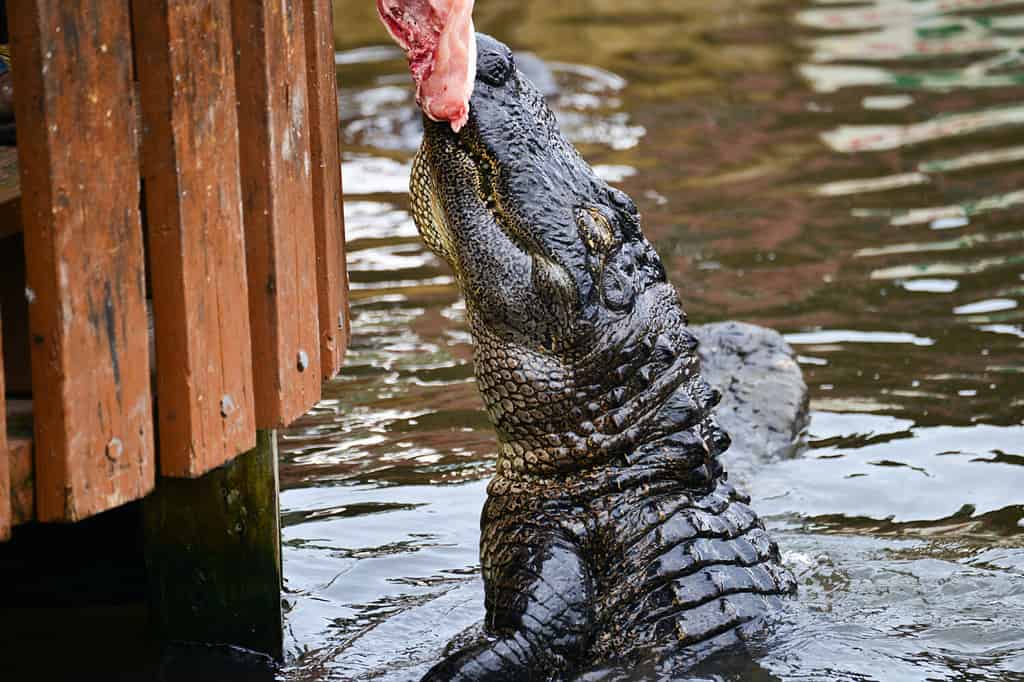
Baited lines are a great way to attract the attention of a hungry gator.
©Orhan Cam/Shutterstock.com
You need a hunting license to hunt gators in Texas. You can have any resident or non-resident hunting license. The exceptions are a non-resident spring turkey license and a non-resident banded bird hunting license. Neither of these will let you hunt gators.
Originally, a specific alligator hunting license was required. However, as of 2005, that is no longer needed. Instead, the alligator hunting license was abolished. Now, most hunting licenses for both residents and non-residents are allowed.
For hunting, both during core and non-core alligator hunting, you will still need CITES tags. For non-core hunting, you will get the CITES tags after you hunt the gator. However, you must have the TPWD (Texas Parks and Wildlife Department) tags in the meantime to put on your catch.
Times You Can Hunt
Texas only allows alligator hunting at certain times. In addition to the fact that it has to be during the actual hunting season, hunters are only allowed out thirty minutes before sunrise until sunset. From sunset to thirty minutes before sunrise, there shall be no baiting lines set or removal of alligators from line sets.
Rules for Catching and Dispatching
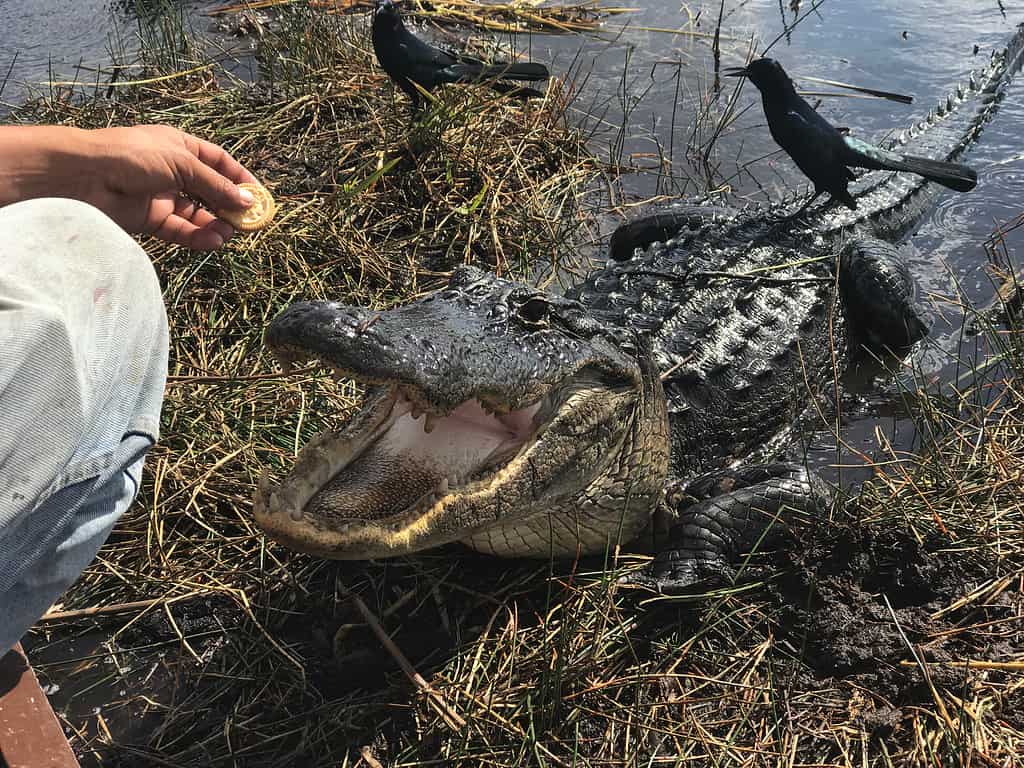
This is not one of the ways it’s legal to catch and dispatch an alligator.
©Tande/Shutterstock.com
There are a few rules for the catching and dispatching methods. This includes what tools you can use and where you can use them.
Property
Texas has some interesting and specific rules for alligator catching. The first rule is that alligators may only be taken on private property. This means that the person hunting the alligator and the taking device have to both be solely on private property.
You will be asked to certify acreage owned. Sometimes, you will be asked to provide proof of ownership. This includes a copy of property tax receipts or a deed. To process your application for alligator hunting, you will also need a map showing the boundaries of the property and your GPS coordinates for the entrance to the property. Your coordinates need to be in degrees, minutes, and decimal seconds.
If your properties are next to each other, you can combine them to increase the number of tags you get. However, this doesn’t work for non-contiguous properties. Multiple landowners can pool their lands, but only one landowner can act as an agent for the properties.
To get tags for core counties, you will need to request a survey. Also, transportation to the property must be provided. Surveys and tags are provided on a first-come, first-served basis. These surveys occur over the first three weeks of June.
Catching
In addition to the taking device and the property owner having to be solely on private property, there are specific rules for the taking device. The hook and line have to be partially above water.
They also need at least a 300-pound test line. These hooks have to be set during the day and cannot be installed until after the hunting season starts. Each line needs to be marked with a gear tag that is permanent and plainly visible. The tag needs to include your full name and address as well as your hunting license number.
Once the lines are set up, they must be inspected daily. If you see an alligator on your line, it needs to immediately be harvested, documented, and removed from the line.
Weapons
Firearms (except for rimfire), air guns, and arrow guns are only allowed on private land and only in non-core counties. Additionally, you can only use them to dispatch an alligator that is on a taking line.
If you use gigs, hand-held snares, and lawful archery equipment need to have a float attached to the line. The floats need to be at least six inches by six inches, by eight inches. For spherical floats, they need to have at least an eight-inch diameter.
For an alligator gig, you must have at least one set of immovable prongs, two or more spring-loaded grasping arms, or a detachable head for it to be legal.
Selling of Gators After Hunting
When you hunt an alligator, you’re more than welcome to keep the skin and meat for yourself. However, if you want to sell the gator, you can’t just sell it to anyone. You must sell it to people that have a valid wholesale alligator permit, or a valid alligator farmer permit.
Thank you for reading! Have some feedback for us? Contact the AZ Animals editorial team.

